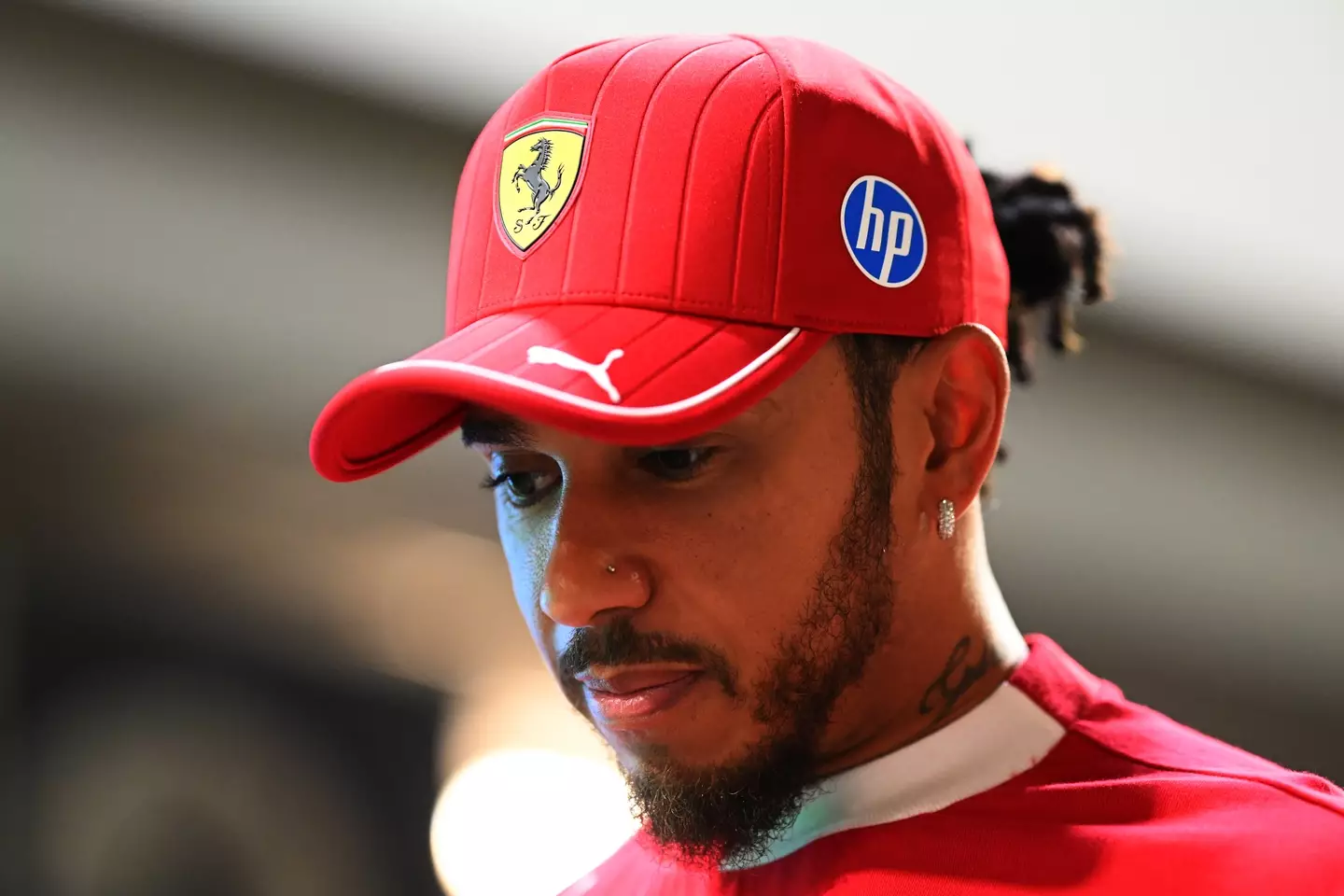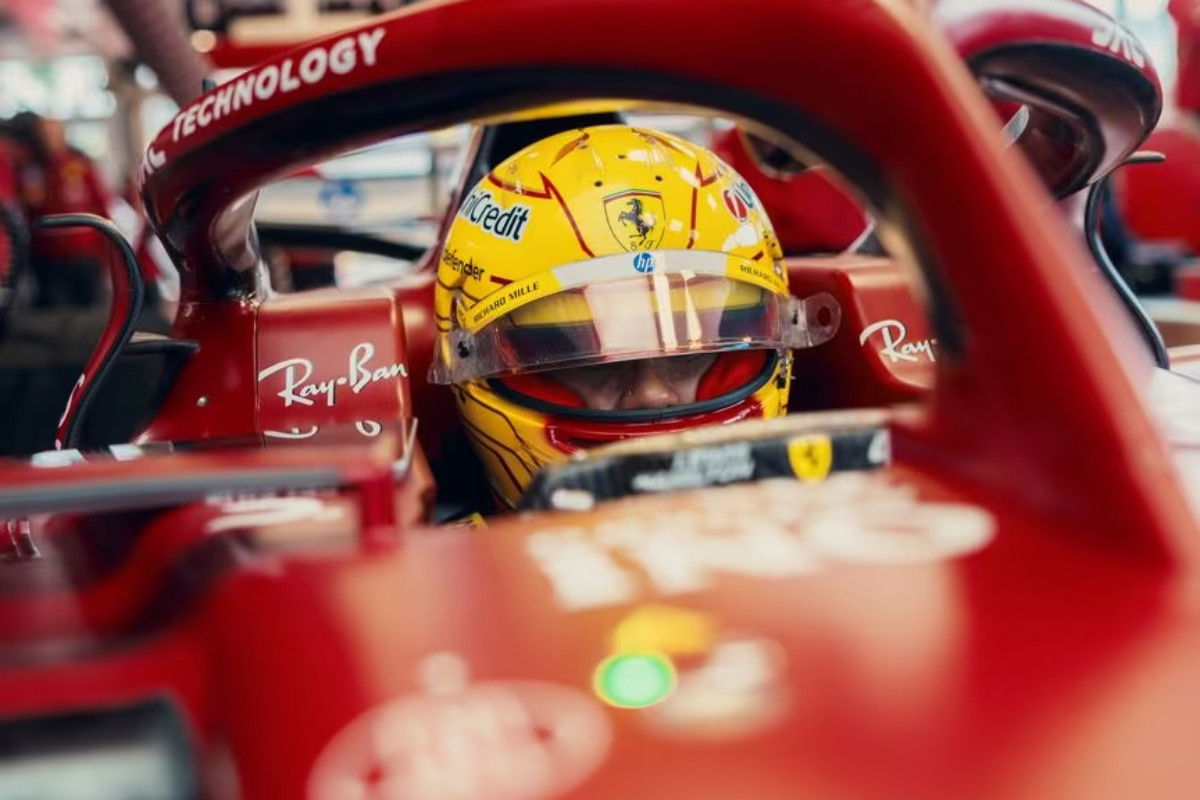The Formula 1 paddock, an environment rarely surprised by drama, is currently grappling with a rumour so seismic it threatens to rewrite the history of the sport’s most illustrious team and its biggest star. Less than a year after his shock move to Scuderia Ferrari, whispers have escalated into explosive reports suggesting that seven-time World Champion Lewis Hamilton may not be offered a contract extension when his current deal expires at the end of the 2026 season.
According to a stunning report by ESPN, several senior figures within the paddock have indicated that Hamilton’s tenure at Maranello could be a short-lived, two-year affair. The reason, they claim, is a blunt, performance-based assessment of his results. If true, the implication is not just a disappointment, but a devastating blow to the legacy of a driver widely considered one of the greatest in history, and a major headache for a Ferrari team desperately trying to return to championship glory.
The speculation surrounding Hamilton’s future is intrinsically linked to one of the most tumultuous seasons in recent Ferrari history. While Hamilton and teammate Charles Leclerc are contracted until at least the end of 2026, the current year has been nothing short of a catastrophe for the Scuderia. Having fought McLaren tooth and nail for the Constructors’ Championship in a previous campaign, Ferrari found themselves out of the title picture entirely, with McLaren ultimately seizing the title. The Italian team is now facing the indignity of potentially failing to secure even second place in the standings, a situation that has sent shockwaves through their management structure.

A Year of Unfulfilled Promise and Performance Gaps
Hamilton’s 2025 season has been defined by a stark contrast to his teammate. He currently sits a painful 64 points behind Charles Leclerc in the Drivers’ Standings. For a driver of Hamilton’s calibre, who arrived at Ferrari with the mandate to lead the team, this performance gap has fuelled the narrative that his best years may be behind him.
His scorecard, while featuring moments of brilliance like a Sprint race victory in China and several competitive P4 finishes, remains devoid of a major milestone: a Grand Prix podium. In fact, a recent race in Mexico served as a frustrating microcosm of his year. A spirited drive saw him in contention for a strong result, perhaps even a coveted top-three finish, only for a 10-second time penalty to derail his efforts and push him down the order. The incident not only cost him points but added further weight to the growing narrative of a season where the pieces simply haven’t fallen into place.
For Ferrari, the move to sign Hamilton was meant to be a statement, a final, aggressive play to combine the sport’s most successful driver with its most iconic team. Instead, it appears to have become a high-stakes gamble that is, by all accounts, not paying off in the way team principal Fred Vasseur had hoped. The team’s disappointing results mean that every single aspect of their operation, from car design to driver performance, is under intense, unforgiving scrutiny. It is in this environment of crisis that the most surprising element of the report emerges: a potential successor already being targeted.
The Unthinkable Successor: George Russell
The name currently being whispered in the corridors of Maranello is perhaps the most shocking of all: George Russell.
The current Mercedes driver has cemented his reputation as one of the sport’s standout performers in the 2025 season. Despite driving a Mercedes car that has been consistently described as not being a championship contender, Russell has managed to achieve multiple race wins and podium finishes. His ability to extract maximum performance from an imperfect machine has elevated his standing across the paddock, catching the eye of the high command at Ferrari.
According to a separate report by Italian publication Corriere della Sera, Russell is “highly regarded at the top” of the Ferrari management chain. They view him as a driver who has conclusively established himself among the grid’s elite since his move from Williams at the start of the 2022 season. The proposal is simple, yet audacious: Russell would be a primary target for the team when either Leclerc or Hamilton moves on. Given the current reports, the former now looks increasingly likely.
This speculation comes at a sensitive time for Russell, who recently clarified his own contract situation at Mercedes. His current deal is structured with a key performance clause that, if met next season, would automatically trigger an extension for 2027. This means that while Russell currently has a degree of security, the potential threat to his position at Mercedes—or, conversely, the lure of a legendary seat opening up—places him in a delicate and high-pressure situation.
The sheer audacity of the rumour—Ferrari moving from one British superstar to another, trading the fading legend for the ascendant star—has injected a ferocious energy into the mid-season narrative. It forces a conversation about loyalty, opportunity, and the cold, hard logic of Formula 1: results are all that matter.

Leclerc’s Unwavering Commitment vs. The Red Bull Domino Effect
While the Hamilton story dominates the headlines, his teammate Charles Leclerc has attempted to pour water on the persistent rumours linking him with a move away from the crisis-hit Italian team. Speaking recently, Leclerc dismissed suggestions of a team switch, insisting that his “only obsession” is to take Ferrari back to the top of the Formula 1 mountain. This statement of unwavering commitment offers a stark contrast to the uncertainty swirling around his garage mate, reinforcing Leclerc’s status as the long-term pillar of the team.
This theme of contract volatility and brutal performance targets, however, is not confined to the front of the grid. It is a universal reality of the sport, and the same pressure cooker environment is visible at the Red Bull family of teams. The team is currently assessing the future of its driver line-up for the pivotal 2026 season.
Yuki Tsunoda, who was promoted to the main Red Bull team following Liam Lawson’s struggles, has himself faced an uphill battle. Despite his promotion, Tsunoda has struggled to consistently extract pace from the car when compared to Max Verstappen, having only scored points in six of the 18 Grand Prix he has entered.
The pressure on Tsunoda is immense. It has been widely reported that Isaak Hadjar, a talent from the Red Bull Junior team, is being actively evaluated as a potential replacement for the following year. Yet, in a slight reprieve, Red Bull team boss Laurent Mekies recently offered public praise for Tsunoda’s recent performances, particularly his showing in Mexico. Mekies insisted that Tsunoda had his “best weekend in a long time,” citing his closeness to Verstappen in qualifying (just two-tenths in Q2) and a very strong first stint in the race. He also conceded that a “slightly long pit stop” had cost the driver points he had earned “on merits.”
Crucially, Mekies declared that Red Bull is “in no rush” to make a final decision, noting that both Tsunoda and “the other kids” are making necessary steps forward. This grants Tsunoda a temporary stay of execution, but it underscores the universal reality that every single seat on the F1 grid is ultimately a performance-driven arrangement, constantly under review by the next generation of talent waiting in the wings.

The High-Stakes Game for 2027
As the sport looks ahead to the significant regulation changes in 2026, the current driver speculation signals a frantic, high-stakes period of planning and negotiation. For Lewis Hamilton, the report is a profound challenge to his desire to end his career on his own terms and with a final, glorious chapter at Ferrari. Should the paddock whispers prove true, his final two years will become a desperate fight for validation, victory, and the right to extend his stay.
For George Russell, the speculation presents the most complicated choice of his young career: remain loyal to the team that elevated him, trusting they can deliver a championship car, or take the leap to the historic Scuderia, potentially taking the seat of his idol.
And for Ferrari, the decision is historic. To part ways with a global icon after just two years, in favour of a younger, high-performing star, would be a ruthless, career-defining move for the management. It confirms that in the relentless pursuit of an F1 title, no legacy is safe, and only current performance can guarantee a future. The final quarter of the season will now be dominated by performance metrics, pit stop analysis, and the brutal mathematics of contract clauses, as the grid holds its breath for the next inevitable shock.